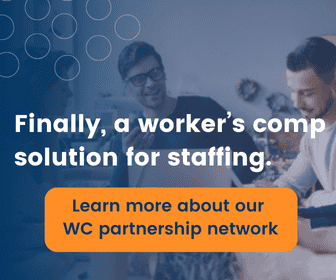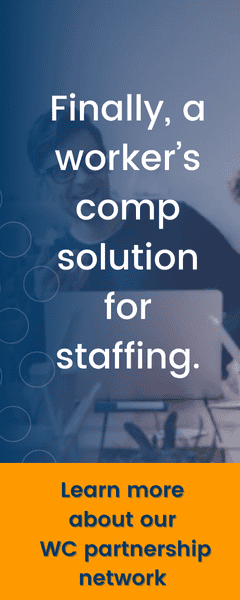6 Common Staffing Industry Questions about Workers’ Compensation

Last time updated: December 17, 2024

The issue of Workers’ Compensation coverage is critical to the profitability and success of entrepreneurial staffing agencies. Many challenges may arise and the solutions can be difficult to find on your own. This can be as overwhelming to experienced staffing business owners, as well as those learning how to start a staffing agency. It is extremely important to know the ins and outs of this aspect of your business, so we went straight to the source for answers from an industry expert, John Iorillo of VENSURE Employment Services.
#1. Why it’s a challenge
Q) Many of our clients and friends in the staffing industry find workers’ comp insurance – securing it, managing the costs, managing claims the claims process – to be one of the most challenging aspects of running their staffing business. Why is it that WC insurance for staffing such an issue?
A) Securing WC for staffing companies is difficult due to the number and variety of class codes they will need to carry on their policy. Each new account that a staffing company provides labor for will require an identification of class code, and perhaps the addition of this class code to their WC policy. Many carriers are cautious to provide insurance to a staffing company, because the complexion of the business can change with each new account. Managing the cost of WC insurance can be difficult for a staffing company as each account can potentially impact the entire policy. For example, one account causing the majority of the claims can result in a significant increase on the staffing company’s experience modifier, thereby increasing the rates and premium for all of their accounts. Claims management is difficult due to the variety of different worksite locations and the geographical restrictions of managing and supervising this dynamic. A lot of staffing companies will hire on-site supervisors to manage some of the larger locations; however, the cost for these positions can have a significant impact of the profitability of the account.
#2. The current market
Q) How would you describe the current market for WC in staffing?
A) Insuring temporary staffing is a risky business for any workers’ compensation insurer. Temp staffing firms are notorious for misclassifying payroll, engaging workers’ in tasks that they are not properly trained for and assigning workers to work at companies that have disregarded their own workplace safety obligations. The overall insurance market is hardening, and this translates to particularly tightening in the staffing industry. There are only a select number of insurance companies and PEOs that will entertain staffing companies, and even then there are underwriting guidelines and class code exclusions to review prior to qualifying the applicant. Strong safety practices and good hiring methods are specific instances that will aid a staffing company looking for extra consideration in this hard market.
#3. Addressing challenges
Q) So given the challenges mentioned about, and particularly in this hardening market, what are some things staffing entrepreneurs can do to address these challenges?
A) One way to mitigate these challenges is to engage a Professional Employer Organization (‘PEO’) who has the systems and processes to deploy safety management practices, periodic site inspections, random drug testing and assigning permanent loss control supervisors and claims managers. Selecting a PEO partner that has the same objectives as your organization will pay off in the long-term. In addition, the quality of a trained workforce is paramount to reducing the frequency and duration of claims.
#4. Biggest mistakes
Q) What is the biggest mistake you see staffing entrepreneurs make relative to WC and how can they avoid it?
A) Improperly classifying employees, untimely reporting of claims, and under billing accounts. There is a lot of pressure to compete and often times a staffing company will use a code they believe adequately suits the employees duties, rather than using the governing class code for the account. This can lead to surprises at the time of an audit and destroy cash flow immediately. Regarding claims, many clients believe they can just manage the claim on their own, or believe it will just “go away on its own”. The first 48 hours of any claims is critical to keeping it under control and managing the cost. Once an employee senses their claim is not important, or being managed properly, the more likely they are to mentally disconnect from their employer and/or hire an attorney. Being an advocate to an injured employee and getting them back to work as soon as medically possible is essential.
#5. What is a PEO?
Q) What exactly is a PEO? How and when might a PEO make sense for a staffing firm?
A) A PEO manages the burdens associated with HR through a weekly relationship with clients. By providing services in payroll, tax compliance, unemployment insurance, workers’ compensation insurance and employee benefits. In addition, a PEO provides integrated services to effectively manage critical human resource responsibilities and employer risks for clients, delivering these services by establishing and maintaining an employer relationship with the employees at the client’s worksite and by contractually assuming certain employer rights, responsibilities and risk. A PEO allows clients to focus on growing their businesses and managing non-employee related areas. A PEO assist clients by reviewing new accounts and providing proper classification codes, onsite loss control services, claims management and pay as you go premium payment structure to avoid those year-end audit surprises. PEOs also tend to have greater buying power in regards to products such as insurance and employee benefit programs and therefore can offer greater flexibility on both pricing and access to coverage in multiple states.
#6. Selecting a provider
Q) As it relates to WC insurance and/or PEO, what should the operator of a start-up staffing firm be thinking about as he/she starts their firm?
A) It is extremely important to perform due diligence prior to selecting a provider. In particular, you should establish the PEO’s experience and capacity in the staffing industry. Because of the turnover in class codes, and sensitivity of calculating accurate bill rates, the start-up firm would need to make sure the provider has expertise in dealing with their industry. The rule that a start-up firm must follow is to classify their employees according to the governing class code of their accounts. Too often we see staffing companies classify worksite employees according to what they are doing, as opposed to the worksite environment they are working in. Correctly classifying an employee is critical to calculating adequate bill rates and ensuring profit margin. In addition, audits by insurance regulatory agencies could lead to significant fines and penalties, and in the most severe cases, criminal charges. The provider you select should have knowledge of this industry specific issue so that the start-up firm is adequately protected.
For more resources visit the Business Development & Strategic Services section of our website.
Up Next

Read More Insights from Jeremy Bilsky
-
Top Travel Nursing Challenges and How Staffing Firms Can Help
The travel nursing industry has faced significant challenges in recent years, particularly in relation to tax and pay issues. During the pandemic and shortly after, there was a huge need for healthcare workers, and travel nurses saw wages double or even triple. Now, many healthcare facilities and medical staffing firms are trying to normalize pay… -

Post-Recession Challenges for Talent Management, Staffing, and Recruiting Agencies
In the world of economics, a recession is a significant decline in economic activity that lasts for an extended period. When a recession hits, it can have a profound impact on various industries, including staffing firms. But what about addressing challenges after the recession is over and the economy is in recovery? Staffing agencies must… -
Talent Management in Times of Crisis: How Staffing Firms Can Drive Success during Recessions
What’s on everybody’s mind lately amidst inflation and uncertainty? A possible recession. What does that mean for staffing firms? During times of economic uncertainty, talent management becomes a critical component of organizational success. Recessions often lead to workforce reductions and budget constraints, making it challenging for companies to attract, retain, and develop top talent. However,… -
Retroactively Claiming the Employee Retention Tax Credit: What Staffing Firm Owners Need to Know
Note: originally posted on Staffing Hub Staffing firm owners may be leaving critical funds on the table – potentially tens of thousands of dollars – all from not knowing these four words: Employee Retention Tax Credit (ERTC). Enacted as part of the Coronavirus Aid, Relief, and Economic Security (CARES) Act passed in 2020, this tax…













